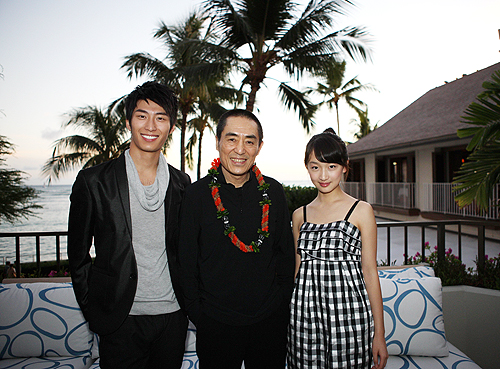|
 |
|
LEAVING MEMORIES: Director Zhang Yimou poses with the stars of his film Under the Hawthorn Tree in Hawaii on October 14, 2010. The film was first launched at the Hawaii International Film Festival held from October 14-24 in the United States (XIE XIUDONG) |
Although Zhang Yimou is perhaps better known for martial arts extravaganzas such as House of Flying Daggers and Hero, his most recent foray, Under the Hawthorn Tree, is no less impressive.
Set against the tumultuous backdrop of China's "cultural revolution" (1966-76), the film has been described as Zhang's "simplest" cinematic venture yet. And simple it is – a spare, understated romance that explores the naivete and melodrama of teenage love and adoration.
In the film, teacher-in-training Jingqiu takes a trip to the tiny village of Xicunping, located in Hubei Province. Jingqiu is sent there to learn from local peasants and conduct research as part of a re-education process – however, she soon finds that she is about to receive an education of a different sort when she meets the young, handsome geology student Sun Jianxin.
Sun is immediately entranced by the beautiful Jing, and makes several passes at her. Being of such a young and tender age, Jingqiu is both surprised and delighted by Sun's overtures. Unfortunately, she soon finds herself torn between her romantic desires and the discretion that was required during that particular period in China's history.
The two carry out a secret romance, with Jingqiu returning to the city while Sun remains in the village. The two make a pact to witness the blossoming of a hawthorn tree, a symbol of Xicunping – the pact acts as a symbol of their loyalty and longing for each other.
Of course, romance never comes without some degree of suffering and heartbreak. Jingqiu's education requires her to undergo a strict probationary period, during which time she must fall in line with the school's tight rules and regulations, which forbid any sort of romance.
Jingqiu's mother soon learns of her secret relationship with Sun, and insists that the two separate from each other until Jingqiu completes her training. Jingqiu initially agrees, but the strain of being separated from her sweetheart eventually takes a toll on her, particularly when she learns of a disturbing rumor about Sun's health.
Director Zhang made a brilliant choice in casting Zhou Dongyu, a previously unknown and untrained actress, to play the part of Jingqiu. A 17-year-old high school student, Zhou's tenderness and naivete are not the result of years of training and experience, but are instead the genuine emotions and feelings of a young girl that has found herself in love for the first time.
She easily convinces audiences that she has truly found herself in an unknown world of emotion; her inexperience and embarrassment at Sun's advances are experiences that nearly everyone has gone through at one point or another. Her pursuit of happiness and true love are both inspiring and heartbreaking, as she begins to realize that her sheltered life has not even remotely prepared her for the harsh reality of love's bitter disappointments.
Dou Xiao's performance as Sun is impressive as well. Although his speech and behavior are embarrassing and discomforting to Jingqiu at first, he soon proves to be an incredibly devoted and genuine man. Audiences cannot help but cheer him on as he jumps into love with blind inhibition.
Zhang's return to a simpler kind of film-making will win over those critics who have found his more recent films to be too bombastic. His work with the camera is particularly understated; small objects like washing basins and light bulbs become tokens of love when focused upon directly. The muted colors employed by director of photography Zhao Xiaoding complement the film's quiet and subtle style. Even the film's guzheng-heavy score, written by accomplished composer Chen Qigang, is spare and simple.
The film is shot in a straightforward linear style; it is not unlike a work of literature in the way that its story unfolds. This is hardly surprising, considering that the script was adapted from an Internet novel written by Chinese mainland author Ai Mi; the novel itself was inspired by a true story that took place during the "cultural revolution".
It is possible that younger audiences will have a harder time connecting with the movie, as the characters' restraint and timorousness is virtually unheard of in modern times. However, that is the strength of Zhang's film: It provides us with a glimpse into the life of two lovelorn youngsters caught up in a drastically repressive time. That the courage of Jingqiu and Sun keeps them together even in the face of such adversity is a lesson that the "little emperors" of China would do well to observe and learn from. | 